
La Recoleta Cemetery is a cemetery located in the Recoleta neighbourhood of Buenos Aires, Argentina. It contains the graves of notable people, including Eva Perón, presidents of Argentina, Nobel Prize winners, the founder of the Argentine Navy, and military commanders such as Julio Argentino Roca. In 2011, the BBC hailed it as one of the world's best cemeteries, and in 2013, CNN listed it among the 10 most beautiful cemeteries in the world.
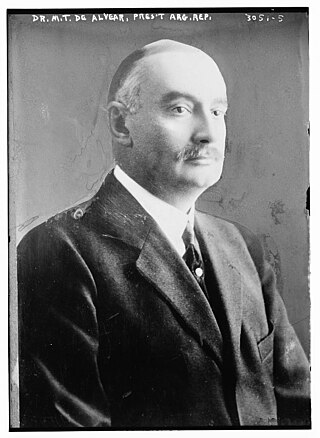
Máximo Marcelo Torcuato de Alvear Pacheco, was an Argentine lawyer and politician, who served as president of Argentina between from 1922 to 1928.
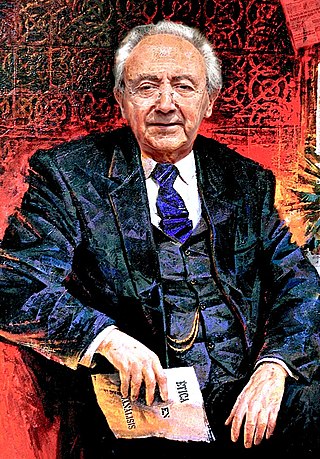
Manuel Isaías López was a prominent child psychiatrist, trained in Philadelphia. Many consider Manuel Isaías López to be the father of Mexican Child and Adolescent Psychiatry. In 1972, he founded the first Child and Adolescent Psychiatry subspecialty program in Mexico, at the National Autonomous University of Mexico (UNAM). He also founded and was the first president of AMPI in 1975. He was the training director of the only child and adolescent psychiatry training program in Mexico, at UNAM, from 1972 until 1998.
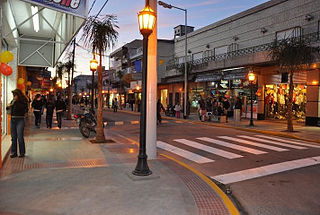
Don Torcuato is a town in the Tigre Partido of the urban agglomeration of Greater Buenos Aires, Argentina. It is named after Marcelo Torcuato de Alvear, ex-President of Argentina, as he had his ranch and residency there. Most of the streets are named after his immediate family and his governmental staff.
Germán Elías Berríos FMedSci, FRCPsych is a professor of Psychiatry at Cambridge University in the United Kingdom.
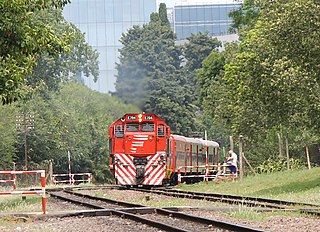
The Belgrano Norte line is a commuter rail service in Buenos Aires, Argentina run by the private company Ferrovías since 1 April 1994. This service had previously been run by the state-owned General Belgrano Railway since nationalisation of the railways in 1948. Ferrovías also formed part of the consortium Unidad de Gestión Operativa Ferroviaria de Emergencia (UGOFE) which operated other commuter rail services in Buenos Aires.

Javier Mariátegui Chiappe was a renowned Peruvian intellectual and psychiatrist. He was the last of the children of José Carlos Mariátegui and Anna Chiappe. Studied at the University of San Marcos where he also started teaching; he was also a founder of Cayetano Heredia University. He was also the founding director of the National Institute of Mental Health “Honorio Delgado - Hideyo Noguchi”. He died in Lima.
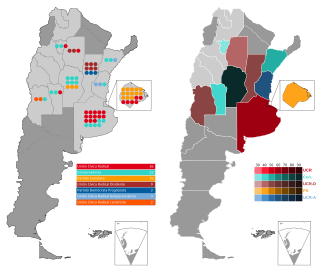
The Argentine legislative elections of 1924 were held on 2 March. Voters chose their legislators and numerous governors, and with a turnout of 44.2%.

The Andalusian Health Service, the government-run health system for the autonomous community of Andalusia, Spain, was created on May 6, 1986, as an autonomous agency attached to the Regional Ministry of Health of the Andalusian Autonomous Government. The SAS is part of the decentralised Spanish National Health System, and is funded through the annual budget of the Andalusian Autonomous Community. As of 2019, the agency has more than 104,000 employees, including nurses, doctors, pharmacists, veterinarians, social workers, and administrative and service staff. It manages 50 hospitals and more than 1,500 local clinics, covering all medical specialities and applying a wide range of treatments and procedures. The agency also runs emergency rooms, ambulances and medical transport, physiotherapy, mental health care, etc. Drugs and prescriptions are subsidized, and people pay a percentage of the price depending on its incomes, with a monthly limit for unemployed and retired pacients.

The Spanish National Health System is the agglomeration of public healthcare services that has existed in Spain since it was established through and structured by the Ley General de Sanidad of 1986. Management of these services has been progressively transferred to the distinct autonomous communities of Spain, while some continue to be operated by the National Institute of Health Management, part of the Ministry of Health and Social Policy. The activity of these services is harmonized by the Interterritorial Council of the Spanish National Health Service in order to give cohesion to the system and to guarantee the rights of citizens throughout Spain.

Hospital Vilardebó is the only psychiatric hospital in Reducto, Montevideo, Uruguay. It opened on 21 May 1880, named after the physician and naturalist Teodoro Vilardebó. The hospital was originally one of the best of Latin America and in 1915 grew to 1,500 hospital inpatients. Today the hospital is very deteriorated, with broken walls and floors, lack of medicines, beds, and rooms for the personnel. It has an emergency service, outpatient, clinic and internal rooms and employs approximately 610 staff, psychologists, psychiatrists, social workers, administrators, guards, among others. The average patient age is 30 years, more than half of whom arrive by court order; 42% suffer from schizophrenia, 18% suffer from depression and mania and also a high percentage of drug addicted patients. It has around 300 beds.

The Hospital Interdisciplinario Psicoasistencial José Tiburcio Borda is the largest and most notable psychiatric hospital in Argentina. Situated on 20 hectares, El Borda is located on Calle Ramón Carrillo, Barracas, Buenos Aires, next to the Child and Adolescent Neuropsychiatric Hospital Garcia Tobar.
Hospital Infanto Juvenil Dra. Carolina Tobar Garcia is a psychiatric hospital for children and young people in Barracas, Buenos Aires, Argentina. Founded in 1968, it is named for Dra Carolina Tobar Garcia (1897–1962), who was notable in Argentina in the field of child and adolescent neuropsychiatry.
Enrique Camarena Robles is a Mexican psychiatrist, doctor and President of the Asociación Ibero-Latinoamericana de Neurociencias y Psiquiatría (AILANCYP).
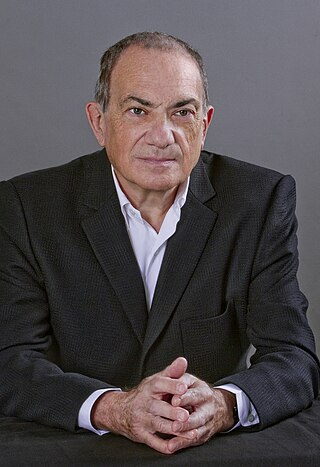
Julio Moizeszowicz is an Argentine psychiatrist. He was born May 25, 1943 in Buenos Aires, Argentina. He is the son of Polish immigrants who moved to Argentina before World War II.

Regina Isabel Luisa Pacini Quintero was a Portuguese lyric soprano, and First Lady of Argentina as the wife of Marcelo Torcuato de Alvear.

This article presents official statistics gathered during the COVID-19 pandemic in Argentina. The National Ministry of Health publishes official numbers every night.
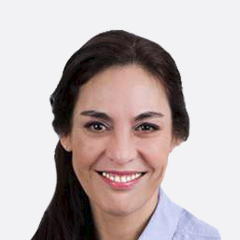
Ana Carla Carrizo is an Argentine political scientist and politician, currently serving as National Deputy elected in the City of Buenos Aires since 2013. She is a member of the Radical Civic Union (UCR).



















